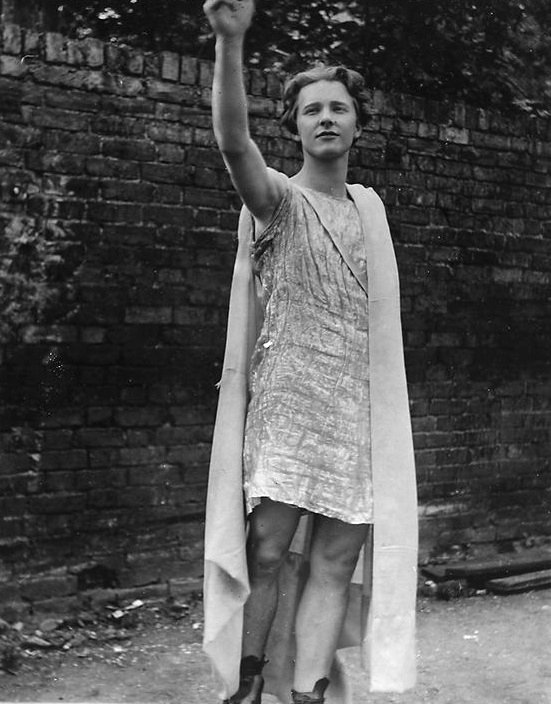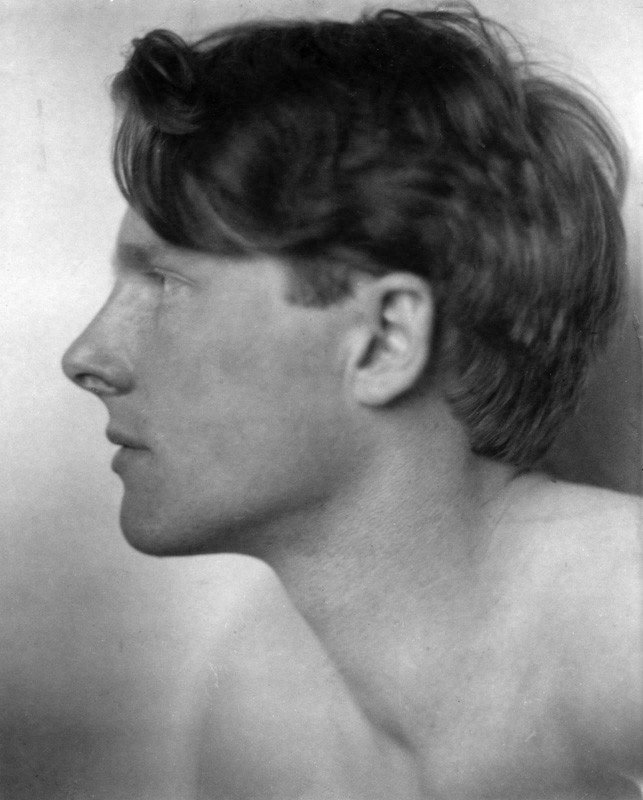



Excerpt from My Dear Boy: Gay Love Letters through the Centuries, edited by Rictor Norton:
Henry James met Rupert Brooke (1887–1915) in Cambridge in 1909, when Brooke acknowledged "I pulled my fresh, boyish stunt" and bewitched the novelist. James's last published writing, in response to Brooke's death in the Great War, and shortly before his own, celebrated Brooke's "wondrous, heroic legend."Coincidentally (ironically) on this date, 27 years before the outbreak of World War One - his poems about which remain so lauded - the man described by the Irish poet W. B. Yeats as "the handsomest young man in England" Rupert Brooke was born. Brooke has become a bit of an enigmatic icon of WW1, particularly during these centenary celebrations, dying young as he did on his way to the front at Gallipoli and having written the classic patriotic stanza:
Brooke's war poems were already famous even before he died at Skyros in April 1915, of an infection rather than in battle. Winston Churchill consolidated the icon: "Joyous, fearless, deeply instructed, with classic symmetry of mind and body, he was all that one would wish England's noblest sons to be in days when no sacrifice but the most precious is acceptable, and the most precious is that which is most freely proffered."
His war poetry was popularized precisely because its rosy images denied the realities of war, and ironically drew many young men to join up and go to their own deaths. He was widely celebrated as a golden-haired Apollo - his photograph at age twenty-five is the first modern icon of beauty - and was desired by everyone, male and female, who came within the Bloomsbury magic circle.
If I should die, think only this of me;
That there's some corner of a foreign field
That is for ever England. There shall be
In that rich earth a richer dust concealed;
A dust whom England bore, shaped, made aware,
Gave, once, her flowers to love, her ways to roam,
A body of England's breathing English air,
Washed by the rivers, blest by suns of home.?
A bohemian in his early years, as all those high-born aesthetes drawn to the "Bloomsbury Set" were, Rupert had affairs with women and men, including Lytton Strachey's brother James (to whom he wrote the most candid letters describing gay sex - one of which is reproduced at Rictor Norton's site [see link above]) and several young men whose acquaintance he made at Rugby School. His sexual obsessions even led him to have a bit of a nervous breakdown. Many historians debate - for their own reasons - whether he was actually homosexual or not, but throughout his short life and to his death Brooke had many close friends who were gay men, and became a "pin-up boy" for many more.
Besides, anyone who can compose a poem of such magnitude as And love has changed to kindliness had an understanding of the human heart in all its complexities that was way beyond his years:
When love has changed to kindliness -
Oh, love, our hungry lips, that press
So tight that Time's an old god's dream
Nodding in heaven, and whisper stuff
Seven million years were not enough
To think on after, make it seem
Less than the breath of children playing,
A blasphemy scarce worth the saying,
A sorry jest, "When love has grown
To kindliness - to kindliness!"...
And yet - the best that either's known
Will change, and wither, and be less,
At last, than comfort, or its own
Remembrance. And when some caress
Tendered in habit (once a flame
All heaven sang out to) wakes the shame
Unworded, in the steady eyes
We'll have, - that day, what shall we do?
Being so noble, kill the two
Who've reached their second-best? Being wise,
Break cleanly off, and get away.
Follow down other windier skies
New lures, alone? Or shall we stay,
Since this is all we've known, content
In the lean twilight of such day,
And not remember, not lament?
That time when all is over, and
Hand never flinches, brushing hand;
And blood lies quiet, for all you're near;
And it's but spoken words we hear,
Where trumpets sang; when the mere skies
Are stranger and nobler than your eyes;
And flesh is flesh, was flame before;
And infinite hungers leap no more
In the chance swaying of your dress;
And love has changed to kindliness.
Beautiful.
Rupert Chawner Brooke (3rd August 1887 – 23rd April 1915)
Our previous entry for Rupert Brooke.

No comments:
Post a Comment
Please leave a message - I value your comments!
[NB Bear with me if there is a delay - thanks to spammers I might need to approve comments]